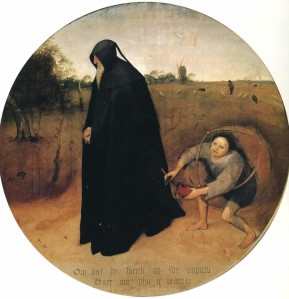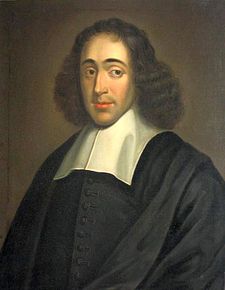
Pieter Bruegel the Elder, The Misanthrope. 1568
The question of whether or not free will exists has occupied philosophers for thousands of years. It is a question that holds broad implications. Indeed, the denial of free will disrupts any notion of moral responsibility. Relatively recently, scientists have also begun contributing to this question by presenting hypotheses based on empirical research. Here, I will bypass any speculation of whether or not free will exists. Instead, I will assume a position, and explore some of the implications of that position. This strategy is designed to uncover if the implications of a position might shed light on its plausibility. The position I will assume is that there is no free will.

Portrait of Spinoza circa 1665
As a reference, I’ll cite Dutch philosopher Benedictus de Spinoza; a key figure in the history of western philosophy who, in part III of his 17th century manuscript “The Ethics”, wrote:
In the Mind there is no absolute, or free, will, but the Mind is determined to will this or that by a cause which is also determined by another, and this again by another, and so to infinity
Spinoza’s rejection of free will is posited on the laws of causality. Of course, any discussion on free will needs to define exactly what is meant by “will”. This is one of the ongoing challenges in the philosophical enquiry into free will (see this summary here). For the purposes of this discussion, I will define the notion of will as the following: the capacity to choose as it exists within the mechanism of thought. In other words: faced with a choice, the individual has a think and arrives at a decision. This definition is undoubtedly open to criticism but, again, this research endeavour is designed to move past the proposition to test its purported implications, not its perfectness. I will come back and revisit these definitions if the need so arises.
Here goes. If there is no free will then:
- The illusion of free will is extremely convincing.I believe that I am responsible for my actions, and that I choose to act in certain ways. Indeed, this belief lies at the heart of much of my human experience, for example: my self-respect depends on what I achieve. If there is no free-will then what I achieve is none of my doing and so the concept of self-respect no longer makes any sense. As mentioned above, the lack of free will also affects the notion of responsibility … but it doesn’t stop there. Emotions such as regret (‘why did I do that’?) and pride (‘I’ve done so well’) depend on the notion that I have some control over my will. So if there is no free will then, by God, the illusion is convincing.This raises the question, what is the mechanism for this illusion?
Just as a trompe-l’œil achieves the illusion of being real by approaching how the eye might see something, I ask: how might the illusion of free will function?
And, just as certain visual illusions (as in the example to the right) can be quickly denied by changing the perspective of the viewer, I ask: how might the illusion of free will be denied?
- I hold no responsibility for my actions.If there is no free will, then I cannot hold responsibility for my actions. Here, I will quickly move past any absurd suggestion that this assertion might lead to some kind of moral depravity.
Instead, I will ask: if I hold no responsibility for my actions, then who am I? And what does that ‘I’ do? If that ‘I’ does not act, does not make decisions, then what does it do?
- How might I pursue happiness?If there is no free will, then how do I, as a human being, pursue happiness? (whether it be, as Spinoza identifies it, through fame (or respect), wealth, or the pleasure of the senses (sex drugs and rock and roll!)).
- How does a philosopher, like Spinoza, come to the conclusion that there is no free will?This last question is very perplexing. If there is no free will, then how does a philosopher come to the conclusion that there is no free will? Again, assuming that the insight of the absence of free will is correct, then how does a ‘not-free will’ come to the conclusion that there is no free will? Read one way, this proposal seems to suggest that having such deep insights is mere chance. Could this be so? Or is there some kind of order, some kind of intelligence that lies elsewhere?


You write, “Emotions such as anger, denial, pride and jealousy all depend on the notion that I have some control over my will.”
What is the basis of this claim of dependence? I would rather suggest that emotions are responses to “situations”. Where does having control of one’s will come in to it?
Hi Ros,
Yes I see how that statement can be seen as a jump. It would be better to remove it (and so avoid the attempted explication below).
A quick and easy answer would be: if there is no such thing as free will, then everything is a response to a situation… including thought. But here I would challenge that thought is different to emotion. Spinoza uses the concept of an ‘affect’ (which is where Deleuze gets it from) which is the combination of an increase or decrease of energy in the body and the mind. He defines an ‘affect’ stemming from an ‘inadequate cause’ as a ‘passion’. In other words, it would be right, I think, to understand a ‘passion’ as an emotion derived from irrational thinking. One example might be anger:… someone trips over my sand castle that took me hours to build. I get flustered, tense, and become aggressive … which is a result of a thinking process that thinks I can no longer take pleasure in the work I have created, and it would take an awfully long time to build it again, and the person who squashed over the sand castle doesn’t respect me …. etc. etc.
In other words, the emotion of anger depends on a notion that I have *done* something and that I *might* do something again. But if ‘I’ has no control over what I do, then what is the purpose in the emotion of anger?
(I’m not sure this is a very good attempt)
if one has no free will, i wonder how some people would have no free will to believe we have free will and other would have no free will to believe we have no free will? ……:)
Hi Kraig,
That’s exactly right. That’s one of the issues. Lets say that it is *true* that we have no free will … and lets say that some people (such as Spinoza) have ‘seen’ that truth. Does that mean that when an individual has seen truth that it is only the result of circumstances? I don’t know.
There is another concept there, which I haven’t referenced or discussed …. it is the notion of insight (different words might be used given different philosophical or spiritual traditions). This is where having a strict definition of ‘will’ is necessary … to differentiate between such things as knowledge and thought, and such things as insight. One way to understand the distinction would be to say that knowledge and thought are ‘worldly’ or ‘phenomenal’ things, that is; they exist in time and space. Perhaps insight exists outside of phenomenal things. But then, how can ‘insight’ affect worldly things? Would that not break the laws of causality? These are the hairy questions that I will get to … but slowly! slowly!
We are a product of our environment, perhaps, and one of our senses. How often do you ‘make a decision’ ?. . . I try to avoid ‘decisions’ as much as possible! I think CHOICE can be divisive, however, to choose is to exert ‘free will’, and therefore, best avoided!!
Sarah, avoiding decision is a choice in itself, is it no? Choosing to avoid making decisions is a choice.
Are you sure you make that decision? (to avoid making decisions?) Or is it a conclusion that your thinking has come without you actually doing anything?
I think yes, it is a choice. Or just plain lazy… ‘the path of least resistance’ as it were.
I was also thinking about it later, cause I make decisions all the time, but because on the whole I am a fairly rational person, it never feels like I made a decision, it feels as though I came to a ‘natural conclusion’ and was no in way torn at the point of taking action on said decision. How about you?
I guess that is what I mean about decisions being problematic. In the past it has been a real issue during times of mental illness actually, since I remember a time when my brain would constantly want to go in two directions (quite literally, in space, here AND there) and it was a long few months of TORTURE, to feel as though I could never BE in two places at once, but my brain would not prefer one over the other in ANY way. Just awful.
Interestingly, I thought, even illness or having not a shred of free will as can come with mental illness, you can LEARN how to make decisions more effectively. Even if I get ill these days, I seem to have taught my brain somehow that we can make a decision, if we try.
Yes, I think we prepare for decisions, and we ‘do’ things and ‘think’ things logically through, that can make decisions easier. It is interesting!
Thanks!
Thanks for the article, it was really thought provoking 🙂
(pardon to add another thought on this) It seems the implication of a lack of free will is that such decisions are made on an instinctual or unconscious level on one hand and learned behaviour on another. Here it is tricky in that it would be hard to dismiss such influences as at least informing and contributing how we weigh the alternatives of different actions. It is a question that touches upon how much the ego is and can be in control. The question might be a matter of degree as opposed to a yes or no.
Hi Kraig,
Yes, decisions would be made (by thought, not by *us*) on the basis of instincts, experience (memory), genetic dispositions etc. But in my understanding, there is no grey area between conscious and subconscious thought … even the most conscious of thoughts is not freely willed. I will try to show this in 2 posts time.
The ego also has no control. This is because, I will try to show, that it doesn’t actually exist, that it is actually just an idea (the idea exists, of course). In fact, I will argue that the ego is the flip side of the illusion of free will. It is the illusion of free will that creates the idea of the ego.
When he ego is offended, for example, it is just an idea that is hurt. That idea depends on the notion of free will. If thought can take consciousness that there is no free will, then there is necessarily no more ego.
How very interesting!! I can’t wait to read your next posts!! 🙂
Pingback: Who, or what, caused Romeo’s death? | Etienne Deleflie on Art and Technology
Pingback: vital sustenance the ART of being WELL » vital sustenance